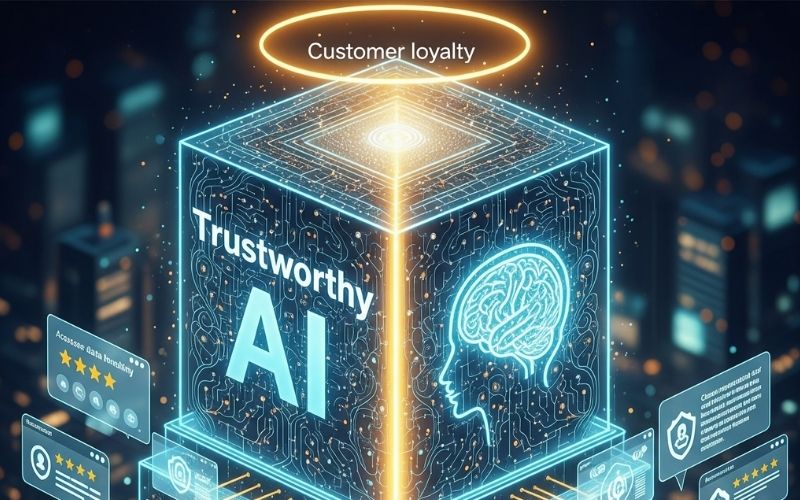As competition grows and customer expectations continue to rise, experience has become one of the few remaining levers for differentiation and customer loyalty. For CX leaders, the challenge is no longer limited to resolving issues efficiently, it’s about moving beyond transactional interactions to ones that foster trust and long-term relationships. AI agents have emerged as an essential tool to supercharge loyalty.
Powered by generative AI, these intelligent agents go beyond simply responding to queries. They solve problems and take autonomous actions that enable businesses to deliver faster, smarter, and more personalised service – a shift that consumers are noticing. According to research from Zendesk, 56% of Australian consumers believe there is a clear gap forming in customer service between companies that use AI effectively and those that don’t.
By implementing a network of service-smart AI agents, businesses can anticipate a customer’s needs, reduce friction, and deliver more meaningful interactions – enabling them to meet rising expectations and retain their most valuable customers. But, getting started requires careful alignment of people, processes, and technology. Here’s how.
Build a comprehensive knowledge base and then scale
For any AI agent to be successful it needs a comprehensive knowledge base with clear and concise information. That’s because when it has direct access to well-structured information it can handle queries swiftly and free human agents to build deeper relationships with their customers.
For companies getting started, focus on high-volume and common queries such as order status updates, shipping information, and product availability. This approach yields quick returns and valuable insights to refine your company’s AI strategy before expanding into more complex use cases.
Over time, and as you build your knowledge base, AI agents can do more than process high-volume and common enquiries, but also send personalised reminders. For example, they can warmly welcome customers back or acknowledge their loyalty status when making a purchase. This human-like recognition makes customers feel more than a transaction and supports deeper brand affinity over time.
Create human-like AI agents to foster meaningful customer connections
While Australian consumers are open to businesses using AI, they want and expect it to go beyond efficiency and feel genuinely human.
As businesses expand their use of AI agents, one way to ensure they retain human-like experiences is by giving their agents a name and personality. Take THE ICONIC’s ‘Tilly’, which successfully handles queries about sales, orders, gift cards, and product enquiries. By giving its virtual agent a name, its consumers feel like the conversation is more engaging and relatable. In fact, 57% of consumers say it’s important for AI agents to have human-like traits.
However, transparency is essential for this to work. Brands should always let customers know when they’re interacting with AI. For example, simple introductions such as, “Hello, I’m Tilly, a virtual team member,” foster trust and set clear expectations.
When businesses focus on creating genuine, human-centred AI interactions across all touchpoints of the customer journey, they don’t just make things run more smoothly—they create trust, loyalty, and a lasting connection with their customers.
Focus on delivering real impact for agents and customers
When implementing AI it’s important to ask: Are we using AI to solve for genuine customer problems or are we adopting technology for its own sake? By answering this question CX leaders can ensure they’re implementing AI that will deliver real value and impact for both their agents and customers.
Take British cosmetics retailer, Lush. It wanted to elevate its customer experience and turned to AI, launching an AI agent called “Marvin” to take care of common customer questions such as sales and discounts. With “Marvin” taking care of high-volume questions and providing context on tickets before escalation, its agents were able to solve issues faster and freed to focus on more complex cases. As a result, its support team is freed up to dedicate more energy to creating meaningful customer interactions.
Australian sports analytics company, Catapult, is another example. It wanted to improve the efficiency of its customer support and turned to AI. By doing so, its agents are able to intelligently triage tickets which has enabled them to quickly and efficiently respond to tickets. As a result, it’s driven a 50% decrease in first reply time and 21% decrease in full resolution time. Most importantly, its agents are freed to work on issues that are more complex, which has supported an uplift in its customer satisfaction score.
With consumers agreeing that a company’s CX isn’t just a touchpoint but critical for their loyalty, leaders who deliver meaningful value will gain a competitive advantage.
Build trust through responsible AI
As AI agents become central to customer interactions, businesses must balance innovation with responsibility. This not only protects customers but also strengthens brand reputation and fosters long-term loyalty.
To build responsible and trustworthy AI, businesses must address five foundational questions:
- How do you protect critical data and prevent bad AI experiences?
- How is your data used to build AI?
- How do you prevent AI from reinforcing harmful biases?
- Do you understand how and why AI decisions are made?
- Do your employees have the ability and knowledge to effectively oversee AI?
By addressing these questions businesses can establish a clear, responsible framework that governs how their AI agents handle sensitive information, escalate complex issues, and respect customer preferences. Furthermore, providing clear visibility into how AI agents make decisions helps boost confidence and a deeper understanding among both customers and agents.
Customer loyalty today requires consistent, personalised, and human-centric experiences. AI Agents, when implemented responsibly and with purpose, can play a pivotal role in delivering these moments at scale. For CX leaders, the path forward is clear: those who invest in thoughtful, human-centered AI will not only improve operational performance, but earn the trust and loyalty that sets great brands apart.


